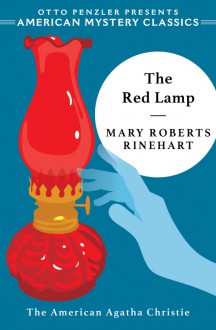
I knew this was a ghost story, of sorts, so I started it bright and early yesterday morning, and became so engrossed in the story that I almost, almost, finished it last night. leaving nothing but 3 of the last 4 conclusion chapters for me to read today.
Mary Roberts Rinehart was an excellent writer; that her genius has been so far forgotten today is a tragedy. The Red Lamp was originally written in 1925, and putting aside the lack of technology and the beautifully elegant writing that today might be considered a tad verbose, the story holds up perfectly; it would take very little to make this story 'modern'.
The Red Lamp is complex to the point of labyrinthine though. Like the main character, I stumbled through the story in ignorance. Some of this was by design, as the mc is meant to be a spectator not an active participant in solving the crimes, but some of it was because there was just so much going on and that beautifully elegant writing of Rinehart's made for easy camouflage of any clues.
The book is, with the exception of the introductory and final 4 chapters, purely epistemological, with no chapters, just journal entries. This style doesn't always lend itself to a submersive experience for the reader, but these journal entries are detailed enough that it makes almost no difference from a first person narrative.
The ghostly part of the story, in spite of the enormous potential for scarring the spit out of me, were subdued enough that they never raised so much as a hair. This was a wee bit disappointing, I admit, but it didn't adversely affect the story; they were never the point of the book, it was always about the mysterious killings and there was never doubt that those killings were done by a very corporeal being.
All in all, this was an excellent mystery. I'd recommend this to anyone curious about Golden Age Mysteries who might be hesitant fearing dry or dated story-telling. While not perfect, The Red Lamp is most assuredly neither dry nor dated.


 Log in with Facebook
Log in with Facebook 








